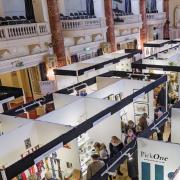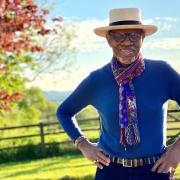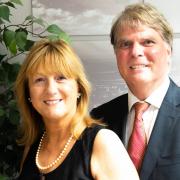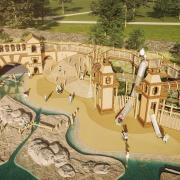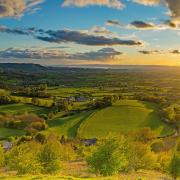Never mind the train - let the plane take the strain...Entrepreneur Neil Cloughley wants air travel to be as easy as getting the bus, and green, too. Lucy Parford finds he’s already airside

The glory days of British aviation, when the country was the envy of the world for its ingenious designs, is driving a Cirencester company to reach for the skies once again.
Entrepreneur Neil Cloughley has been inspired by his father’s own aviation business, as well as pioneers from the past including R.J. Mitchell, who designed the Spitfire in the 1930s and other great British aviation inventions including the Vulcan, Harrier, Concorde, Trident and the jet engine.
By setting up Faradair Aerospace Limited, Neil is keeping a promise he made when he was a teenager to carry on the family’s tradition of designing and building innovative new aircraft. His father, Trevor, is the former Managing Director of ASVEC UK Ltd, which was a ground-breaking Unmanned Air Vehicle (UAV) manufacturer in the 1980s and 1990s.
“It all harks back to when I was 16 years old,” Neil recalls. “My father had a UAV business, unmanned air vehicles, like the Predator which is flying around now.
“His company was building what would have been the first Unmanned Combat Air Vehicle (UCAV) back in the mid-80s and 90s. Unfortunately, he couldn’t get UK Government backing.”

The business didn’t survive and the memory of it being forced to close has left a lasting impression on the family.
“I had seen my father put his life and soul into this business, since he created it,” says Neil, who grew up in Surrey. “At weekends and school holidays I would work on the aircraft. I made him a promise when we closed the factory and shut the doors in Andover, that I would do something with it, one day in the future.”
After spending 12 years working in the commercial aircraft market in Britain and America, Neil launched his own business, Faradair, in 2014 which has ambitious plans to produce ground-breaking Bio-Electric-Hybrid Aircraft (BEHA) – a six to eight seat aircraft with a hybrid propulsion system.
Neil based the company in Tetbury Road, Cirencester, rather than London, due to the south west’s strong connection to aircraft production in the past and the choice of airfields nearby.
Faradair’s BEHA concept incorporates a design-patented triple box wing which delivers slow flight and high lift capability, enabling the aircraft to take off and land from extremely short runways of various surface types.

Neil believes it has the potential to drastically change the way we travel, reducing frustrating commuting times and costs.
“If you go from Cardiff to London tomorrow by rail it’s going to cost £200,” he said. “That’s ridiculous. “I’ve just flown to Sweden for £16.99 each way. We were paying £10,000 a year just for my wife to go to work in London.”
In contrast, BEHA would have low operation costs, Neil says, offering a viable intercity commuter option. The amount of time sat in traffic jams or waiting for delayed trains could also become a thing of the past, with business people and holidaymakers being able to take the pain out of getting to and from their destination. For example, flying from Cirencester to Stanstead Airport in under half an hour, rather than an arduous route by road.
Spending hours in summer holiday traffic on the M5 could also be avoided by simply jumping on a plane from Oxford to Newquay.
“You could use it like a bus, rock up, pay and go. How cool would that be?” says Neil. “Why aren’t we doing it already? There are three reasons - noise, emissions and operating costs.

“I thought I would come up with an idea, take the design ideas my father had back in the day of joined wing technology and design something special that does the job and delivers that.
“It’s probably not going to reach the sound barrier or host a VIP party at 40,000 ft but it will get up and off the ground very quickly, quietly and efficiently.”
Carrying small numbers of people on short distances has operated successfully in the past – Neil recalls the de Havilland Dragon Rapide, a short-haul biplane built in the 1930s to carry eight to 11 passengers. You can still take a vintage ride in one.
What sets BEHA apart is its hybrid ability to take off and land with electric power and to be cleaner, quieter and cheaper to operate through fuel saving, yet use a new clean sheet designed, efficient internal combustion engine that could use biofuel as the primary in-flight propulsion power for a more eco-friendly form of air transport.
While some manufacturers see the future shaped by all-electric aircraft, Neil believes the technology has some way to go to make it viable, whereas his prototype could be taking off in 2020.
“When we first launched in 2014, everybody was talking about electric, no-one was talking about hybrid,” Neil says. “Airbus called theirs E-Fan electric, but they’ve reviewed their programme and just cancelled it are now talking about hybrid. They’d already spent £20m on that project.”
Alongside its BEHA airframe, Faradair is working on a new state-of-the-art hybrid propulsion system- the H600 Hybrid Engine which utilises a new JetA/Biofuel capable internal combustion engine working with twin electric motors to deliver a duel propulsion engine combined into one unit.
This is being designed by world-class motorsport engineering and advanced technology firm, Prodrive, in Banbury. The engine will recharge the batteries of the electric motors in the aircraft, which could be used to save fuel whilst taxiing and during take-off to reduce fuel burn and noise.
The long-term objective of Faradair is to scale up its BEHA design to create a larger variant for regional passenger transport.
The team behind Faradair includes not only Neil and Technology Director Jason Saunders, but also Chief Aerodynamicist, Dr Ben Evans, from Swansea University. Ben is one of the men who has been tasked with keeping the Bloodhound SSC land speed record car on the ground.
The company’s advisory board also includes Ken Scarince, former Financial Controller for Virgin Galactic, Erlendur Svavarsson, from Loftleidir Icelandic, who has worked in the airline industry since 1992 and wildlife expert Will Travers OBE, co-founder of The Born Free Foundation.
Neil hopes one of the BEHA variants could one day be used to connect remote communities, by being used for activities such as island tourism by day and to deliver supplies by night. The aircraft could even be used to aid conservation efforts such as combating poachers and tracking wildlife.
The first phase of development has been completed, CFD modelling and simulated optimisation at Cranfield University has delivered a design which is offering flight characteristics not seen for an aircraft of its size and weight capability.
Everything now hangs on investment, with Faradair looking to raise £1.5m initially, leading to a further £8.5m.
If successful, it forecasts the creation of 500 jobs within the next five years with aspirations to create a green aviation technology park for its headquarters.
“We know the business model works and the technology works and now we’re just trying to get investment,” Neil says.
The 43-year-old has been inspired to keep pushing forward with Faradair’s vision by the likes of Wiltshire-based inventor James Dyson, who his wife now works for since giving up the London commute, and aeronautical engineer R.J. Mitchell who always believed in their designs, even when plenty of obstacles were put in their way.
“Sir James Dyson knows the challenges of setting up a manufacturing business in the UK and how British mentality will often give 20 reasons why you cannot do something, but I lived for four years in America, in San Francisco near Silicon Valley and there it’s all 20 reasons why you can do something,” Neil laughs.
“If we’ve got a new Government coming in, wouldn’t it be an idea for them to do what they’ve said they’re going to for SMEs and start-ups, start looking at new growth and start-up companies and give them the best support we can.”
However, he admits the future of Faradair might not be in Gloucestershire, but overseas.
“At the moment we’re deciding where we are going to be based in the future,” Neil admits, who recently flew out to see potential foreign investors. “Other countries cannot do more for you.
“The Government’s got to do a better job of supporting business, especially small start-up businesses, because at the moment we are struggling.
“It would be a great shame to move from here, I love Cirencester, but this project has really got to take off, and I mean that as a pun, we want this plane to take off in 2020 and we need the support to see if we can make that a reality.”
Faradair has got off to an impressive start, winning two awards last year, New Business of the Year at the Cirencester Chamber of Commerce Awards and a Business Innovation award at the Gloucestershire Business Awards, which father and son received together.
“He is super excited about it all,” Neil says. “He is seeing technology change. His visions and the idea he had, he didn’t have the technology available to him in the 80s and early 90s, but he can see that technology now which could make a lot of that reality. It’s very exciting for him.
“We’ve been through the whole process, starting up and expanding with a small team.
“When the doors had to shut on his business, there is nothing worse than laying people off, it’s the worst experience in the world, such a loss. So for me, it’s great having him a part of this new venture to help steer and guide us.
“The day this aircraft flies, that’s going to be the most emotional day for me and my family. There will be lots of tears and celebration - two generations of family work has gone into this, it will be a very special day.”








